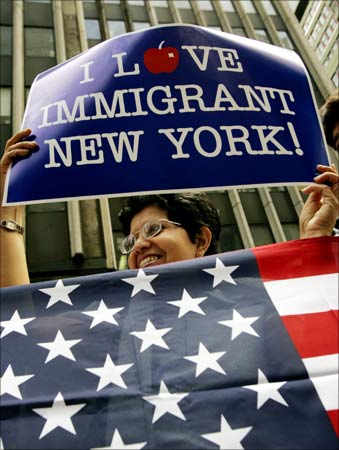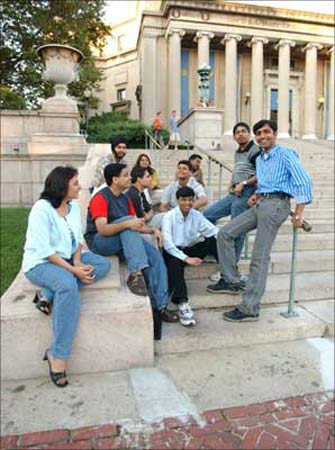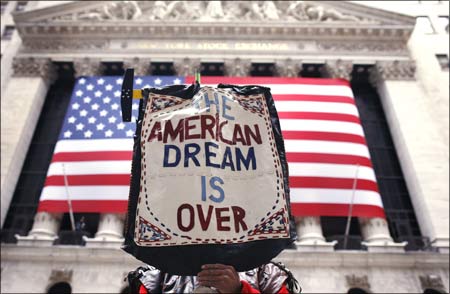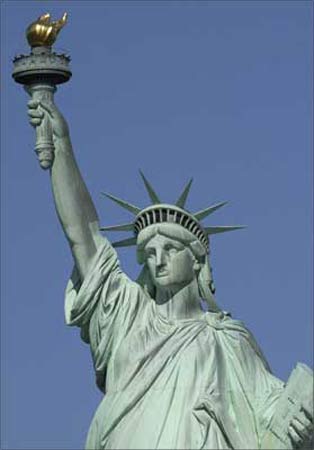Photographs: Jason Reed/Reuters Moira Herbst, BusinessWeek
Editor's Note: This story is the first in an occasional series examining the role of immigration amid economic recession.
As unemployment rises and the economy sinks further into recession, an old debate has become new again: the question of immigrants' impact on the US economy. On one hand, the chorus of calls to restrict immigration is getting louder.
Many US workers are fearful of losing their jobs and want to ensure that the domestic workforce gets priority for new positions, especially for those created by the taxpayer-funded economic stimulus plan. On the other hand, tech, health-care, and other companies warn that tightening restrictions on immigrants will hinder, not help, the economic recovery.
Enter President Barack Obama. Despite his long to-do list, he says he wants to act on comprehensive immigration reform this year, and is expected to address the issue publicly this month. Like the 2007 bill that ultimately failed in the Senate, a new proposal is expected to include a path to citizenship for the estimated 12 million undocumented workers in the US.
But Obama Administration officials say the plan would not add new workers to the American workforce.
Despite lobbying, H1-B quotas unlikely to grow
Image: Bill Gates, Microsoft founder and co-chairman of the Bill and Melinda Gates Foundation.Photographs: Denis Balibouse/Reuters
That would disappoint employers in sectors such as health care, farming, and technology, who say they're in need of workers despite rising unemployment.
Hospitals and other health groups say there's a critical shortage of nurses in the US, while farmers say they can't find enough workers to help milk cows, pick fruit, and harvest vegetables. In technology, companies like Microsoft, Google, and Oracle say they need more workers from overseas for jobs in software design and engineering.
They have lobbied to increase the number of temporary visas for skilled workers, called H-1Bs, from its current annual limit of 85,000.
Worker groups counter that if employers boost wages, they'll find plenty of US workers to fill open positions. With unemployment on the rise and potentially headed for double digits, it's unlikely employers can win more temporary work visas.
"It will be impossible to push a large-scale temporary worker program," says Alexander Aleinikoff, dean of the Georgetown University Law Center and a member of the Obama team's immigration task force.
Immigrants-complementing or replacing native US workforce?
Image: A woman holds an American flag during naturalisation ceremonies for new citizens in New York.Photographs: Shannon Stapleton/Reuters
At the heart of the debate about immigration is the question of whether immigrants are complementing or replacing American workers.
If they complement US workers -- because they possess rare abilities or will do jobs natives won't -- they make a net contribution to the US economy and even help create jobs.
But if they replace native workers with similar skills, US workers can be displaced and wages dampened, reducing the spending power of at least some populations.
Of course, what impact immigrants have ultimately depends on what laws are in place and how they're enforced. Some economists say that given the state of the economy, lawmakers should focus on inviting in more highly skilled, high-wage workers in certain professions on a permanent basis, thereby filling labour needs while increasing the tax base and encouraging home and car purchases.
They also argue that legitimising the status of the 12 million undocumented workers will level the playing field both for US workers competing with them and for employers who compete against rivals that use cheaper, undocumented labour.
Contributing to the economy, even as it falters
Image: Indian students at an American university campus.Photographs: Paresh Gandhi/Rediff Archives
This series of BusinessWeek.com stories is designed to go beyond the Washington policy debate to look at the lives of immigrants tech entrepreneurs, artists, and nurses who are contributing to the US economy even as it falters. Immigrants like those profiled tend to contribute positively to the US economy, culture, and society.
The series will tell the stories of real people caught in the middle of the debate over immigration, revealing the human drama behind the policy debate. We'll look at how hopes and dreams have clashed with reality. We'll also include a snapshot of the job market in each of their industries, which will provide a context for the broader employment situation.
Our aim in focusing on individual stories isn't to obscure the fierce policy debate over immigration. Advocates for immigrants point to studies like a 2007 report from the White House Council of Economic Advisers, which concluded that immigration as a whole increases the US gross domestic product by about $37 billion each year.
Immigrants increase the size of the total labour force, and that, by definition, has a positive impact on GDP. Immigrants also contribute purchasing power to the economy, which in turn creates additional jobs.
Whos's at risk here?
Image: A demonstrator holds a sign reading The American dream is over during a rally outside Wall Street in New York.Photographs: Shannon Stapleton/Reuters
But immigration can also displace US workers and dampen wages in certain industries and demographic groups. An April 2009 report written by Prasanna Tambe of New York University's Stern School of Business and Lorin Hitt of the Wharton School at the University of Pennsylvania estimates that H-1B admissions at the current levels are associated with a 5 per cent to 6 per cent drop in wages for computer programmers and systems analysts over time.
"In this paper, we simply sought to dispel the myth that globalisation generates no losers. Globalisation does appear to have a negative wage effect on workers in some occupations," wrote Tambe and Hitt in the paper, which reflects the research findings by Harvard economist George Borjas. (Tambe and Hitt declined to comment on the paper until after the academic peer review process.)
Similarly, wages can be pushed down in certain low-skill jobs if the supply of workers rises significantly through immigration. And immigration can allow employers and government to avoid the hard work of improving the skills of the existing domestic workforce.
"The more we are able to solve skills shortages by importing workers from other countries, the fewer incentives we have to improve the schooling and educational training opportunities for our domestic and more disadvantaged populations," says Gerald Jaynes, professor of economics Yale University. "In fact, there's almost no incentive."
And who stands to gain?
Image: The Statue of LibertyPhotographs: Chip East/Reuters
Academics aren't in agreement on the issue. Amar Bhide, a professor of economics at Columbia University, calls studies like Tambe and Hitt's "junk science" propagated by "techno-nationalists." Bhide argues that immigrants have a negligible impact on wages.
Instead, immigration performs a critical role in what he calls a "venturesome economy," in which immigrants most often complement native workers and add to the growth and dynamism of an economy.
Immigrants themselves may offer the strongest evidence of the positive effects. Take Jennifer Gould Keil, Canadian-born author of the non-fiction book Vodka, Tears, and Lenin's Angel, for example. Already an established writer, she obtained her visa in 2001 to stay in the US to further develop her craft.
Now a columnist for the New York Post --and a permanent resident since marrying her late husband, an American -- Gould Keil says she is grateful for the opportunities afforded her, which in turn benefit the country. "(The visa) allowed me to come here, make a living, and contribute," she says.
At the same time, "Immigration is a valuable source of brain power to the US," she says. "Without it, the country wouldn't grow and prosper."







article